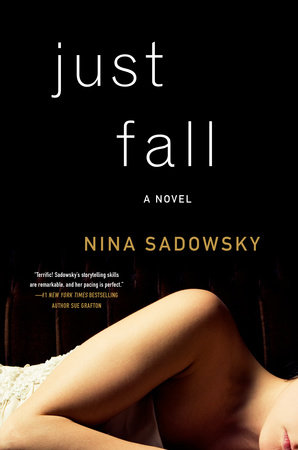By Amy Lutz, MCWC Executive Assistant
We are thrilled to welcome Hollywood’s Nina Sadowsky to MCWC 2018! Nina will be teaching our first-ever screenwriting workshop, sponsored by Humanitas.
Nina is a screenwriter, film producer, and novelist. Her first novel, Just Fall, is now in development as an original series for STARZ. Her second novel, The Burial Society, was published February 2018 by Ballantine Press. She has written numerous original screenplays and adaptations for such companies as The Walt Disney Company, Working Title Films, and Lifetime Television, and serves as adjunct faculty at USC’s School of Cinematic Arts program, teaching both writing and producing.
Nina will be teaching The Business of Show: Successful Screenwriting at MCWC 2018. This workshop will provide an in-depth view of writing for film and television. The mixture of lecture, in-class exercises and workshopping of participants’ material will reveal how material is pitched, developed and produced in Hollywood; give an overview of television and film story structure and craft; as well as provide tips for successful screenwriting that are also applicable to other genres.
Our Executive Director, Shirin Bridges, sat down with Nina to discuss this unique opportunity:
Hi Nina, thank you so much for giving us the time for this interview. And an even bigger thank you, of course, for agreeing to give a workshop on screenwriting at MCWC 2018. It’s such an honor for us, and such a great opportunity for our participants, that Humanitas is sponsoring MCWC’s first screenwriting morning workshop. Can you tell us a little about Humanitas and the Woolf Pack, and about your involvement with them?
The Humanitas Prize is an organization that recognizes and promotes writing that explores and elevates the human condition in film, television and theatre. The organization sponsors several different initiatives, including the New Voices program that gives writers a chance to develop a TV pilot under the guidance of a seasoned mentor, and two college fellowships (one for drama and one for comedy, each of which come with a $20,000 cash prize for the winning student). This year, I became the Director of Educational Outreach for Humanitas and ran the college fellowships.
The Woolf Pack is a group of women, primarily TV and film writers and/or producers, also formed under the Humanitas aegis, who support each other and various initiatives for creating more opportunity for women writers. I’ve been a member of the Woolf Pack since its inception, so have seen the value of this kind of community first hand.
You will be teaching screenwriting from a rather unique vantage point: you’re an experienced screenwriter for both the small and big screen, but you’re also a very seasoned producer and you’re a novelist. How do you think those different perspectives are going to frame the workshop you give?
Film is the marriage of art and commerce more than any other art form. The multi-million dollar budgets most films command, along with the additional marketing costs required to make those films stand out in a crowded field, make that union indivisible. Understanding the craft of storytelling is essential for screenwriters, but understanding how the business works is just as important. My workshop will cover the creative aspects of writing a screenplay, such as character development, structure, the elements of drama, pacing, and transitions, as well as provide an understanding of how the business works so writers can best position their material for sale.
As I’ve expanded into publishing novels, which I am now also adapting for television, I have learned how to create a brand an identity for myself and my work. We’ll discuss branding in my workshop, as it is an essential tool for anyone working in media.
As someone who does both, how does putting on your screenwriting hat strengthen your work on novels or short stories—or nonfiction, for that matter? How has your novel-writing influenced your screenwriting?
Working in film has taught me why it’s important that character drive story, how theme influences narrative, the importance of perspective in a scene, how the reveal of information impacts pacing, the value of fluid transitions, and how to communicate character through action. I apply these principles to all my writing, regardless of medium.
One of the beauties of writing prose is that you can luxuriate in a character’s interior thoughts or take a digression to provide backstory or exposition, neither of which is true in screenwriting. I release a big exhale when I go back into writing a novel, happy to have that freedom. On the other hand, having learned to do without those tools as a screenwriter, I rely on them sparingly and tactically in my prose, which I think contributes to the “economy” or “control” in my writing that reviewers praise.
And let me share a trick: When starting a new scene for a novel, I close my eyes and put my “producer hat” on, envisioning what each department would have to contribute in order to bring that scene to life. Where’s the location? What has the production designer dreamed up? What mood has the cinematographer brought with lighting? Are there weather effects? What does the sound department have to contend with? How is the costume designer communicating character through wardrobe? This trick reminds me to think about the impact of a scene on all the senses and frequently provides unexpected creative opportunities.
Many of our participants are interested in screen adaptations of their work, but I’m sure some might find joining this workshop a big leap. Many may not have actually put pen to paper on a screenplay. Obviously, if they sign up for your workshop, they’ll have to bring work to share. Do you have any advice for them that might make this a little less daunting? Tips on where to start so that they can give you the pages you need in three months? How many pages are you looking for, by the way? Or are you happy to work from synopses?
I’m less interested in pages than the important pre-writing process of identifying a) whose story is being told and b) what themes the writer wants to tackle and why. If someone has their own novel that they’re interested in adapting, they are already way ahead of the game as they have a full plot and presumably developed characters and themes as well. But writers are welcome even with just an idea.
I firmly believe that voice is the single most important quality for any writer. Voice can’t be taught, it’s the unique combination of experience, research, perspective and lens that each of us brings to the keyboard. That being said, I teach techniques that show how to lay virtually any story across a classic film structure. My job is to help participants figure out how to best tell their story. In order to do that, I want each writer to send me:
a) a logline – a one sentence description of the plot
b) a synopsis – a one paragraph synopsis of the story (that also includes the genre and tone)
c) a statement of theme – a one paragraph statement about the universal themes of the work and why telling this story is important to the writer
d) the first scene – properly formatted
I expect that during the course of the workshop participants will find the structure for their story or develop the tools to do so once they’re back on their own. So, the last thing I want people to do is rush to finish a full draft before we meet.
I would suggest participants read a screenplay or two before the conference. Many are easily available online. Find a script for a film that you know and like and compare how the script compares to the finished film. Then watch a favorite scene with the sound off and dissect the visuals: see how much music and sound design contribute; how the production and costume design choices advance the narrative; what camera angles were chosen; how it’s lit, how it’s cut, etc. This will help prepare screenwriters for the understanding that a script is not a finished thing in and of itself but a road map for countless people in various capacities to follow and enhance.
We just had the Oscars last month with its emphasis on diversity and inclusivity—on bringing on those who have been long overlooked. You dedicate a lot of your time to teaching and mentoring, both with the Woolf Pack and for USC. Why do you feel it’s so important to nurture the next generation of screenwriters? Won’t talent just rise by itself?
I get more from mentoring and teaching then I’ll ever put out, so it’s purely selfish. I’ve taught at USC’s School of Cinematic Arts for ten years and have also taught at Syracuse University’s Semester in LA program (SULA), Columbia College Chicago’s Semester in LA program and Hedgebrook, as well as being asked to do fun “one offs” (like speak to engineers at Northrup Grunman about the power of creativity). I’ve always believed in mentoring and the last 10 years of formal teaching have brought me into contact with people from all over the world who have challenged my perspectives and taught me as much as I’ve taught them. I’ve also discovered that having to teach what I believe about writing and filmmaking required me to formally articulate those beliefs, which in turn helped my own mastery of them. Teaching and mentorship is all win-win for me.
After a couple of years of being a publisher, I realized I knew so much about the publishing industry that could inform the way I approached getting published—information I never had despite being a published author. How did your producing experience inform the way you wrote and pitched screenplays, and will you be covering what you learned in class?
As noted above, I believe a screenwriter can’t work successfully in the industry without an understanding of how the business works, so yes, I will definitely be including valuable information about such things as determining where content “fits” into the marketplace, demographics, and trends in buying and selling. I’ll also cover representation (the difference between managers and agents, for example) and how to “produce” one’s own career.
Having a Hollywood insider on the Mendocino Coast is really exciting—in fact, some of us might get a little star-struck! You’ve worked with Meg Ryan and Matthew McConaughey and Samuel L. Jackson and… So let’s end on why we shouldn’t be intimidated by you. What’s a goofy, human thing you do? First thing that pops to mind!
I am the least intimidating person on the planet! Frankly, I’m a big goof ball, so it’s hard to pick just one thing. But the first thing that pops to mind about my goofy self is that I love to dance, and do so around the house all the time. I have some skill in that regard (despite my creaky bones) having studied dance when I was younger, but I also sing out loud while I boogie, which everyone and anyone on the planet should be spared.
Thank you so much for your time today and in August, Nina. I am really looking forward to welcoming you to our conference.
You can register now for Nina’s screenwriting workshop, at mcwc.org. To secure your spot, register as soon as possible—MCWC 2018 workshops are filling up quickly!
To find out more about Nina Sadowsky, check out her website at https://www.ninarsadowsky.com/.
To learn more about the Humanitas prize, please visit their website at https://www.humanitasprize.org/.






